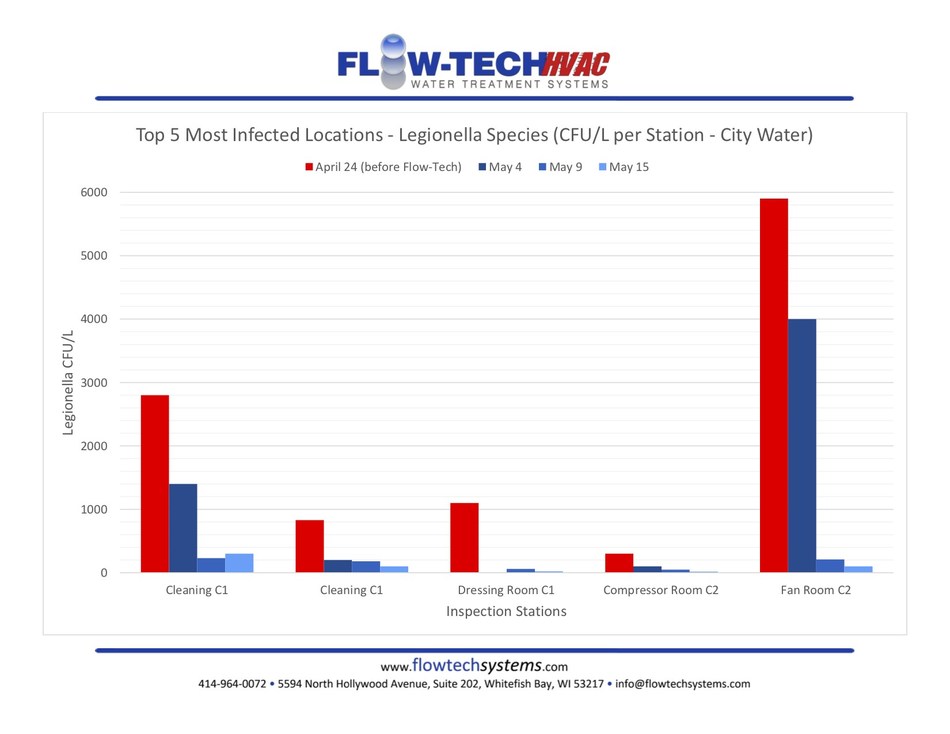Hospital's Legionella Counts Reduced to Non-Detect with Flow-Tech Systems Technology
Published on by Water Network Research, Official research team of The Water Network in Case Studies
Flow-Tech's chemical-free technology successfully reduces critical care hospital's legionella counts from 6,000 CFU/mL to non-detect.

Hospital's Legionella Counts Reduced to Non-Detect with Flow-Tech Technology.
In 2017, a critical care hospital in Utah documented legionella counts over 6,000 CFU/mL within its domestic water system. The bacteria, found in both potable and non-potable water systems, causes Legionnaire's disease—a severe, often lethal, form of pneumonia. The hospital implemented their legionella management plan, which included heating the water above 140°F for more than 30 minutes and lengthy system flushes. While the legionella counts temporarily dropped to 200 CFU/mL, they returned to previous populations between treatments due to the continued presence of biofilm within the pipes.
Working with the Utah Department of Health to perform the necessary tests, the hospital installed Flow-Tech's technology and discontinued their previous legionella management plan. In less than two months, Flow-Tech removed the existing biofilm and reduced legionella counts to below the 10 CFU/mL "detectable" threshold. Flow-Tech reduced legionella counts by more than 98.5% compared to the hospital's hot water treatment.
Also in 2017, Flow-Tech was installed at a hospital in Uppsala, Sweden, in an effort to reduce legionella counts present throughout the facility's water systems (SEE CHART). "This pilot project is very valuable," said Jonas Långmark, PhD, the microbiologist overseeing the application. "Use of the tested technique appears to be a reasonable addition/alternative to treating water for a general purpose to keep bacterial levels down."
Flow-Tech is the only chemical-free water treatment system to meet and pass the American Society of Heating, Refrigerating and Air-Conditioning Engineers (ASHRAE) protocol for controlling sessile bacteria, or biofilm. Biofilm creates a hospitable environment in water systems where legionella is able to grow and flourish. The technology can be installed without causing system downtime or inconvenience to patients or healthcare providers.
SOURCE TO PRESS RELEASE ABOUT Hospital's Legionella Counts Reduced to Non-Detect
Media
Taxonomy
- Legionella Control
1 Comment
-
This is a Flow-Tech marketing add mixing and miss-stating data with regard to ASHRAE research data - and actually using ASHRAE to support a product and technology that is w/o science-based data as reported.
1. The American Society of Heating, Refrigerating and Air-Conditioning Engineers (ASHRAE) does NOT have a "protocol for controlling sessile bacteria, or biofilm" as stated above, much less does ASHRAE recognize or endorse products to "meet and pass" such.
2. The ASHRAE research project Flow-Tech references above (that Flow-Tech participated in) was ASHRAE Project Number 1361-RP-1361: Biological Control in Cooling Water Systems Using Non-Chemical Treatment Devices (2009) -- and NONE of the 5 non-chemical devices tested in the study showed biological growth control under the conditions of the testing in the pilot scale cooling tower systems.
3. The ASHRAE research project (cited above) was a cooling tower research project and not a building domestic water system project (as, confusingly, presented above).
I do not like to present such strong rebuttal verbiage in an open media forum, but I was Chair of the ASHRAE Technical Committee (TC3.6, Water Treatment) that sponsored the ASHRAE Research Project 1361-RP. This article mixes cooling tower water with domestic potable water (Legionella) control, completely "stretches" research data beyond the science, and is first and foremost a marketing add verses any meaningful, certainly truthful, evidence-based science article. (IMHO)